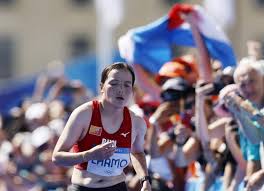Arun Kumar Shrivastav
A marathon runner from Bhutan who finished the 42.195 km marathon at Paris Olympic in 3 hours 52 seconds and was the last one to finish the race received a rousing ovation from the spectators. Kinzang Lhamo finished the marathon 1.5 hours after the winner, who took the gold medal. Netherlands’ Sifan Hassan broke the Olympic women’s marathon record by completing it in 2 hours, 22 minutes 55 seconds in the Paris Olympics. But she was not the one who received the loudest of the applause. Just three seconds behind Hassan came Ethiopia’s Tigst Assefa who clinched the silver and Kenya’s Hellen Obiri defeated compatriot Sharon Lokedi with a four-second margin. But it was the 26-year-old Bhutan’s Lhamo who finished last, among all the 80 participants who completed the race, who received a standing ovation from the Paris Olympic crowd.
Almost all news outlets across the world covered her story of determination and perseverance. As many as 11 runners failed to finish the race but Lhamo was not among them. The Guardian reported that before the Olympics Lhamo said, “My first goal is to complete the marathon.” Lhamo was Bhutan’s national flag bearer during the opening ceremony and the only female in her nation’s squad.
The marathon course was hilly and hot and at times Lhamo had to slow down to walk. But she was encouraged during the last few kilometres by spectators who ran and cycled alongside her. “It has always been one of my dreams, to compete at such a stage,” Lhamo had said ahead of her Olympic debut.
The Washington Post carried her story with a headline, “Kinzang Lhamo kept moving, and marathon fans shared an Olympic moment.” Reuters’ headline was “Bhutan’s marathon runner gets standing ovation for last-place finish.” The Guardian ran the story with a headline, “Fans unite in Paris to rouse Bhutan’s Kinzang Lhamo for marathon effort.” NBC News’ headline Bhutan’s Kinjang Lhamo fulfills promise, finishes marathon” underscores the reason why she kept running for 90 minutes after the gold, silver, and bronze medals were already claimed. She had to promise to fulfill! The Los Angeles Times published a commentary with a headline, “Final finisher of women’s marathon shows what it means to be an Olympian.
Writing for The Athletics, Luke Brown writes, “Eleven athletes withdrew from the marathon after starting but Lhamo is still going and is receiving plenty of support from the crowd, many of whom have decided to walk the rest of the way with her. What an absolutely brilliant story on the final day of the Games in Paris.”
Competitive sports like the Olympics provide a platform for sports persons to push the bars to their limits. While they compete with each other, they also compete with oneself, each time trying to push their own capabilities to the limit. While running the Paris Olympics marathon as a debut runner, Kinzang Lhamo had two objectives: one, to complete the marathon, and two, she should be able to beat her best record. While she was able to achieve her first objective of completing the Olympic marathon, she missed to beat her personal best by a whopping half an hour.
The Los Angeles Times writes, “She walked most of the final two kilometres, with dozens of people on either side of the barricades that lined the course walking alongside her, offering encouragement and simply company. The procession soon became a parade…thousands waited for the medal ceremony, which was delayed by the building human drama of Lhamo’s race… and when she entered the final stretch, the crowd stood and applauded.”
Recounting the grande finale, the correspondent writes, “After crossing the line Lhamo made her way to a plastic chair as a volunteer placed a wet towel on her shoulders. She would need medical attention, her coach said. “Cramps,” he added.
But the cramps weren’t expected to keep her from carrying her country’s flag again in the closing ceremony. Because as Lhamo’s marathon performance proved, the Olympics aren’t about winning, they’re about taking part. Daily Kos described her feat with a headline that had a sign of period at the end. “The Olympic Spirit, condensed version.”
The Hindustan Times carried an article about “The Olympic moments that made Paris 2024 special” and in it, it used a feature image of KinzangLhamo’s Paris marathon run. KinzangLhamo is a name associated with Tibetan Buddhist culture. Kinzang is a common name in Tibet and Bhutan and it means peaceful, tranquil, enlightened. Lhamo is also associated with Tibetan culture and it’s a folk dance form like opera. (IPA)
Trending Now
E-Paper


